26 miles of wine and cheese: The madness of the Marathon du Medoc, the world’s daftest (and booziest) running race
It’s been dubbed ‘the world’s most idiotic marathon’: a 26-mile run through vineyards, fuelled by wine and cheese. Emma Hughes finds out if she has the stomach for the legendary Marathon du Médoc.

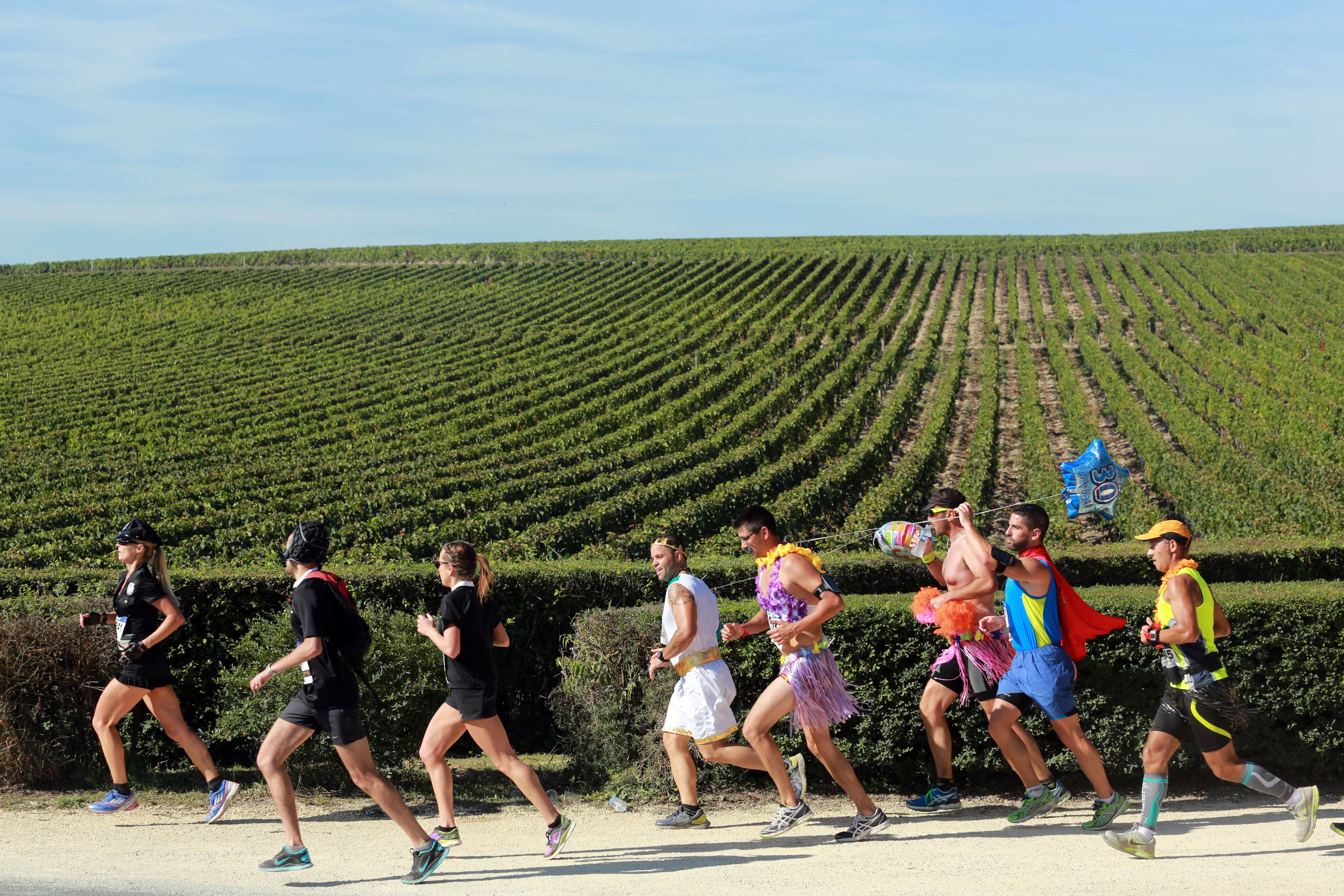
History doesn’t record what Pheidippides, the Ancient Greek soldier who ran to bring the Athenians news of their victory over the Persians in the Battle of Marathon, was thinking as he trudged along. Whatever he imagined his legacy might be, it almost certainly wasn’t a long line of people in various states of intoxication wobbling through vineyards, trying not to be sick.
The Marathon du Médoc, which has been taking place in and around Pauillac since 1985, is infamous. Participants (who tend to be British; in terms of doomed endeavours, this is up there with the Charge of the Light Brigade) are expected to break 23 times to gorge themselves with the region’s finest — and richest — foodstuffs. Plus, of course, a glass of claret at each stop.
‘Is this the world’s most idiotic marathon?’ ran the headline on a feature covering the race a few years ago. The general consensus appears to be ‘yes’. And I’ve put my name down to do it.
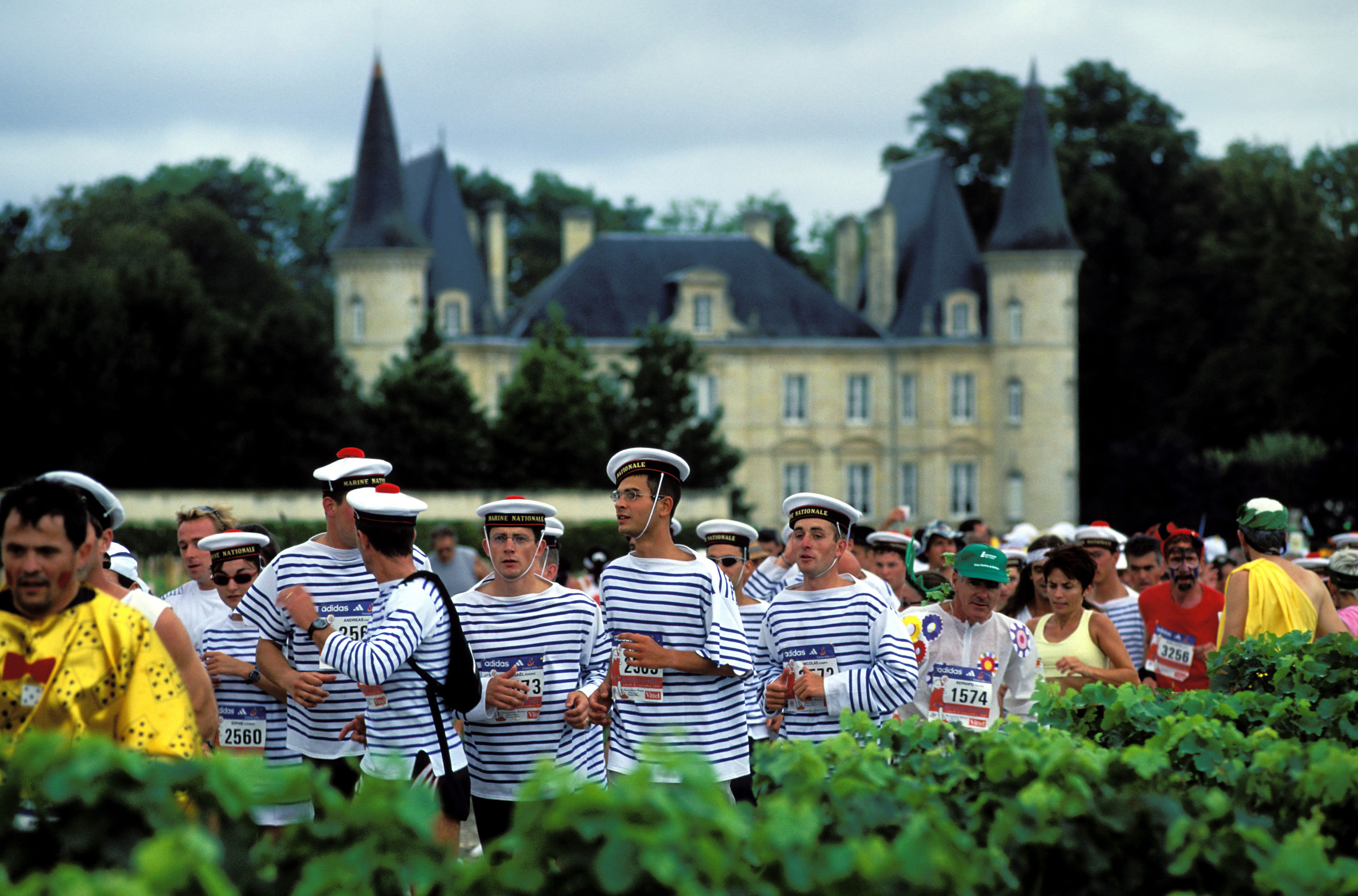
I am neither a runner nor a heavy drinker, so I’ve pressganged my friend Edward into joining me. He’s a Withnailian dilettante whose blood type is Port.
We’ve barely taken off for Bordeaux when he reaches into his bag and pulls out a travel-sized bottle of sherry. ‘Full of electrolytes,’ he announces, offering me a swig.
I decline, thinking of the gargantuan quantity of wine I’ll be expected to get through the following day. Nobody, I tell myself, has ever actually died running the Marathon du Médoc — but there’s always a first time, isn’t there?
Our base for the weekend is Les Sources de Caudalie, an enchanting collection of converted barns and a grand manoir arranged around a lake: The Wind in the Willows meets Versailles. Wine, obviously, is the thing here: the hotel’s rooms overlook the famous Château Smith Haut Lafitte winery and the spa offers a series of ‘vinothérapie’ treatments.
Exquisite houses, the beauty of Nature, and how to get the most from your life, straight to your inbox.
‘I wish I’d trained more, but is there anything that can prepare you for stuffing a wedge of brie into your mouth as you endeavour to keep up with a drunken Scarlet Pimpernel?’
My plan for the night before the marathon is for us to join some other runners at one of the official pre-race pasta parties. Edward has other ideas. ‘I’ve booked a table in the hotel restaurant,’ he tells me. ‘We’re having five courses.’ His eyes twinkle evilly. ‘And matching wines.’
I take the guide to pre-race nutrition I’ve cut out of Runner’s World to dinner, but my resolve evaporates in the face of tomato tarte tatin, monkfish with preserved-lemon risotto and a caramel mille feuille for two. The wines, all of which come from across the road, are outstanding. ‘Think of it as training,’ Edward instructs as he brims my glass for the umpteenth time. We stagger off to bed at midnight.
Five hours later, our alarm goes off — the starting gun is fired at 9.30am and we’re nearly 80 miles from Pauillac. We struggle into our costumes — fancy dress is mandatory. Edward, for no clear reason, has come as a Georgian fop, complete with canary breeches and a cravat. As a result of a misunderstanding with the fancy-dress shop, I am dressed as a traffic cone. The forecast for today is 30˚C; I already feel as if I’ve been swaddled in asbestos.
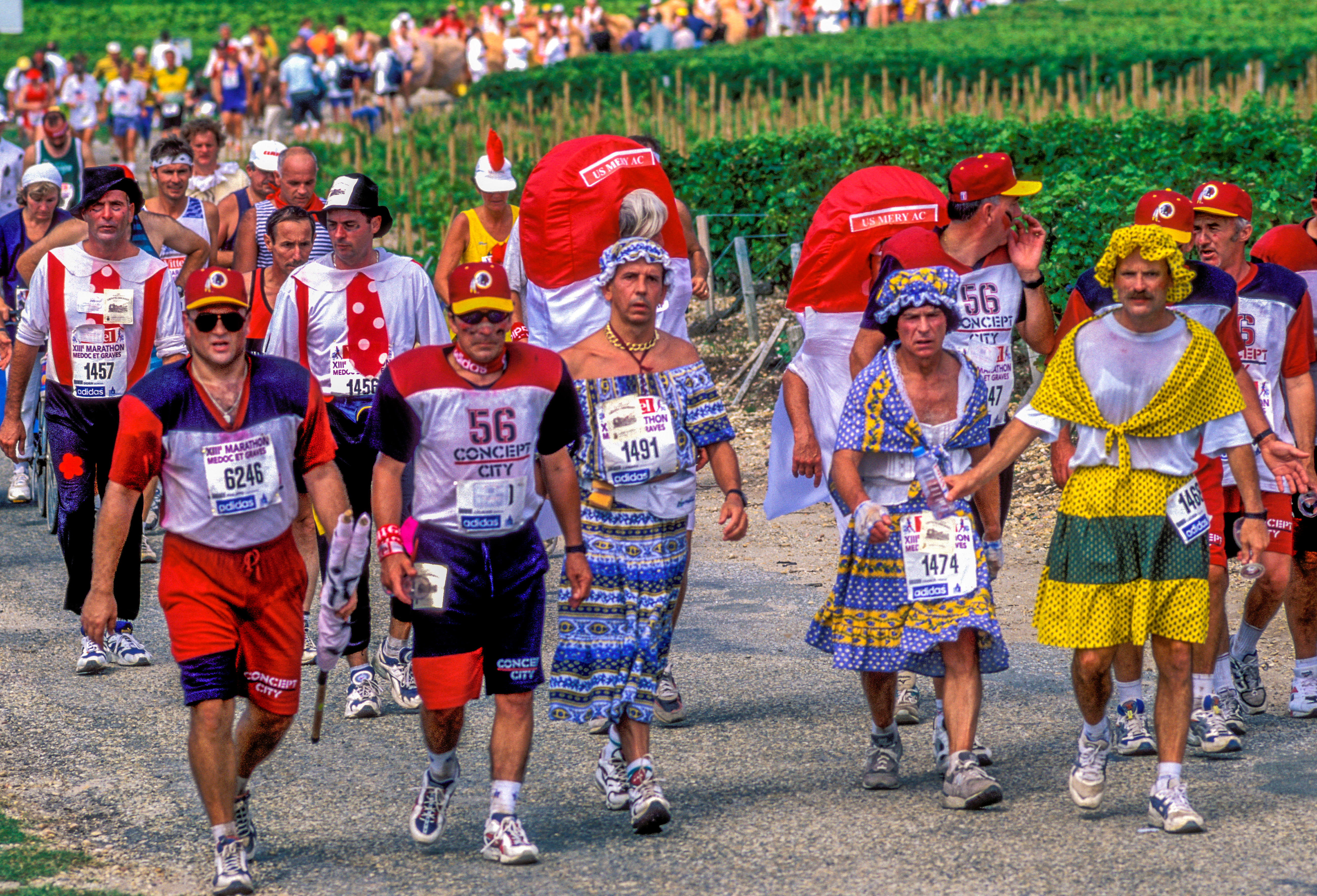
The train to Pauillac is rammed with British people, many of whom also look very much the worse for wear. It’s standing room only; Edward and I clutch the pre-marathon picnics the hotel has kindly packed us off with, swaying slightly. The journey passes in a queasy blur. Whenever we go through a big wine name, such as Margaux, my stomach lurches.
Pauillac itself has been completely taken over by the race, with jacketed marshalls stationed outside every bistro and tabac. The pavements are packed with runners: we pass all Seven of the Dwarves, as well as Asterix and Obelix doing calf stretches.
A number of experienced-looking participants, I notice with alarm, are already dosing themselves with Imodium.
We fight our way to the media tent, where Jean-Yves, the charming press officer, loads us up with bottles of water. ‘Drink lots of this, yes?’ he says, bundling us towards the starting line. ‘Not just wine, okay?’
There’s barely time to steel ourselves before we’re shunted into motion by a Viking longboat being pulled by six men in horned helmets. The marathon route loops south from Pauillac and heads down towards Bordeaux, before winding its way north again and finishing right where it started.
It takes in household names such as Château Lafite, Château Mouton Rothschild and Château Latour and, within minutes, we’re among the vines. It’s already scorchingly hot and there’s little shade, but the crowds cheering on the side of the road are a tonic.
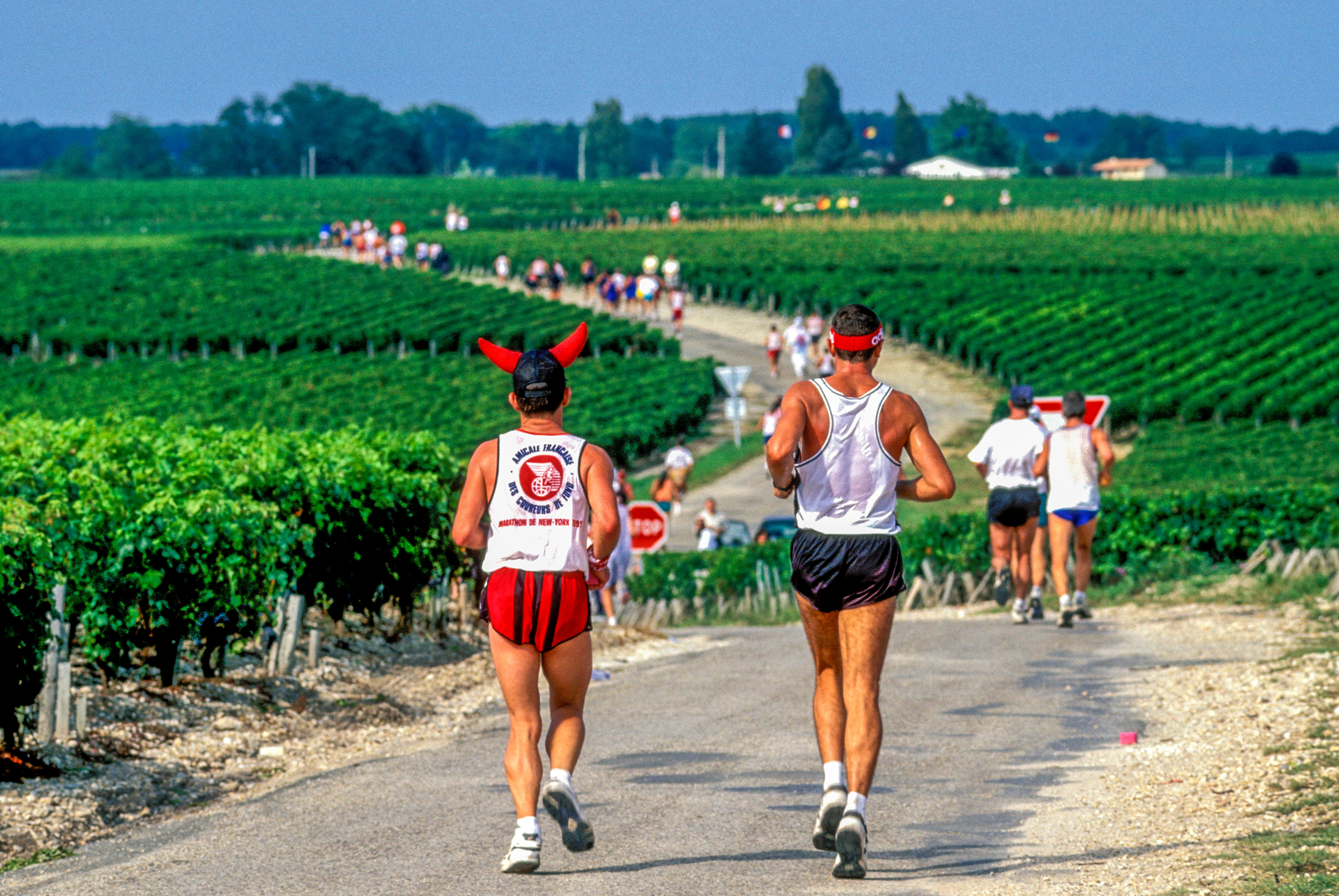
It becomes apparent that we’re going to need a little more help than that when, less than three miles in, we’re overtaken by someone being pushed along in a shopping trolley. ‘We need to run faster,’ I wheeze at Edward, who’s stopped to chat to a group of Japanese tourists, all of whom want their photos taken with ‘Mr Darcy’. ‘It may be too late for that,’ he says, pointing behind me: hot on our heels is the Sweeper, a float adorned with brooms that urges runners to keep their pace up (the cut-off time for the marathon is 6½ hours).
We set off at speed, the coffee I chugged earlier to clear my head sloshing around ominously in my stomach. Luckily — or unluckily, depending on your perspective — we’re almost at the first stop.
‘Hanging off a vine is a dinosaur suit, tragically crumpled. We stop in front of it, paying our respects to the fallen’
The grounds of Château Lynch-Bages are full of trestle tables laid out with beakers of red wine and cheese biscuits, as well as more usual snacks, such as bananas. They’re staffed by volunteers from the town, who urge us on with cries of ‘Allez!’. A Tyrannosaurus rex waddles past eating a KitKat.
Each stop merges with the next. We’re struggling along at mile eight when a honk from the Sweeper forces us to take evasive action. ‘Over here,’ Edward hisses, gesturing towards the vines themselves. We cut a corner by sprinting through them, emerging on the other side, significantly further ahead, to whoops and cheers. We’re press, rather than official participants, so nobody seems to mind.
I wish I’d trained more, but is there anything that can prepare you for stuffing a wedge of brie into your mouth as you endeavour to keep up with a drunken Scarlet Pimpernel?
At about mile 11, we make an executive decision to switch from jogging to walking. The sun is beating down mercilessly; rivers of sweat are pouring out of my traffic-cone suit and Edward’s cravat is gently steaming.
We’re not the only ones to have succumbed to the wrath of grapes: the road is littered with false moustaches, wigs and clown shoes. Hanging off a vine is a dinosaur suit, tragically crumpled. We stop in front of it, paying our respects to the fallen.
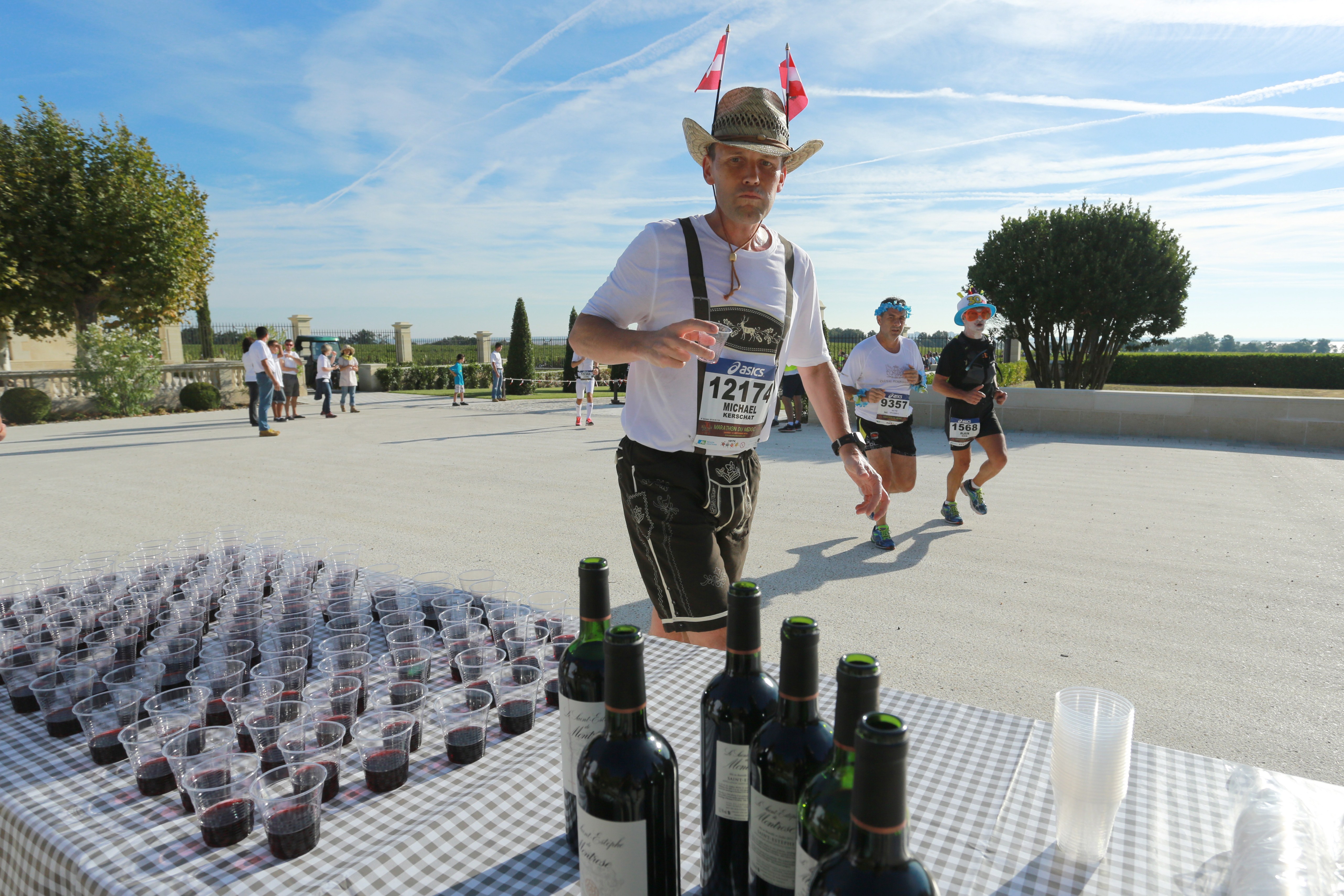
‘You know, we’re about halfway,’ Edward says, consulting his map, ‘which means we’re actually very near Pauillac.’ He pauses and raises an eyebrow. ‘Spot of lunch?’ I nod, more grateful than I have ever been in my life.
We limp to the nearest fromagerie, where we feast on fresh baguettes, farmhouse cheeses and cherry jam, surrounded by fellow marathon escapees. Our table has a view of the finishing line and we watch as the first runners start to trickle through. Everyone looks ecstatic.
As we’re paying the bill, Jean-Yves emails with the news that the fastest person completed the course in an astonishing time of two hours and 28 minutes. ‘Perhaps next year,’ Edward shrugs gallicly.
Back at Les Sources de Caudalie, the pool is a shimmering oasis and I sit on the edge with my feet in it, whimpering.
Another guest looks up from his book. ‘You know,’ he remarks, ‘you look like you could really do with a glass of wine.’
The Marathon du Médoc takes place every year in September — for details and to register, visit www.marathondumedoc.com. Rooms at Les Sources de Caudalie from €300 per night — www.sources-caudalie.com.
This article originally appeared in Country Life in 2019.
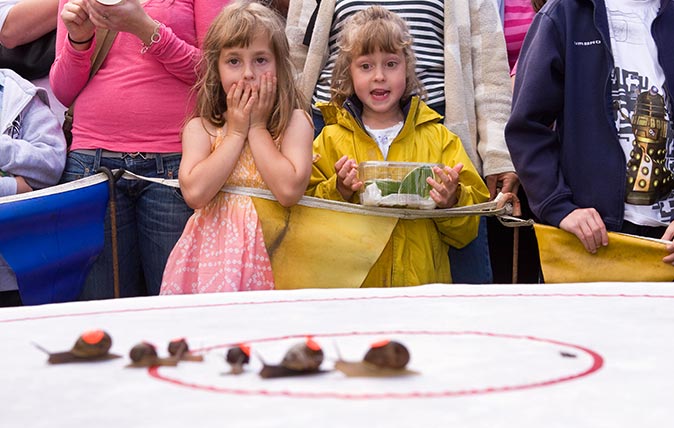
Ready, steady, SLOW! The wonderfully eccentric (and very British) world of competitive snail racing
Summer in the British countryside brings with it all sorts of unusual events and celebrations – and they don't get any
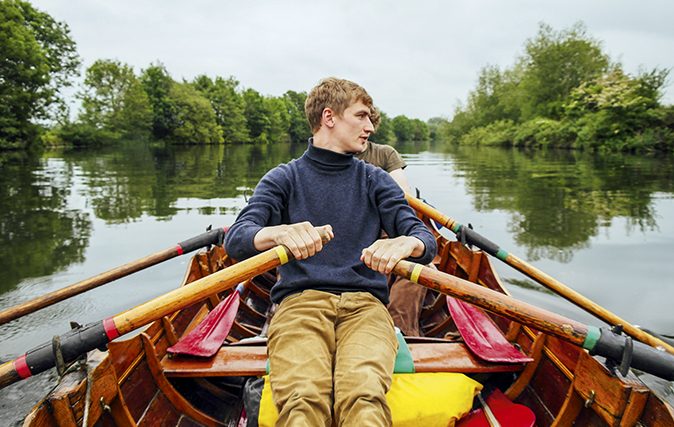
We recreated Three Men in a Boat for the 21st century. Here's what happened.
Re-creating Jerome K. Jerome’s Three Men in a Boat sounds terribly romantic, doesn’t it? Patrick Galbraith discovers the reality of
Emma Hughes lives in London and has spent the past 15 years writing for publications including the Guardian, the Telegraph, the Evening Standard, Waitrose Food, British Vogue and Condé Nast Traveller. Currently Country Life's Acting Assistant Features Editor and its London Life restaurant columnist, if she isn't tapping away at a keyboard she's probably taking something out of the oven (or eating it).
